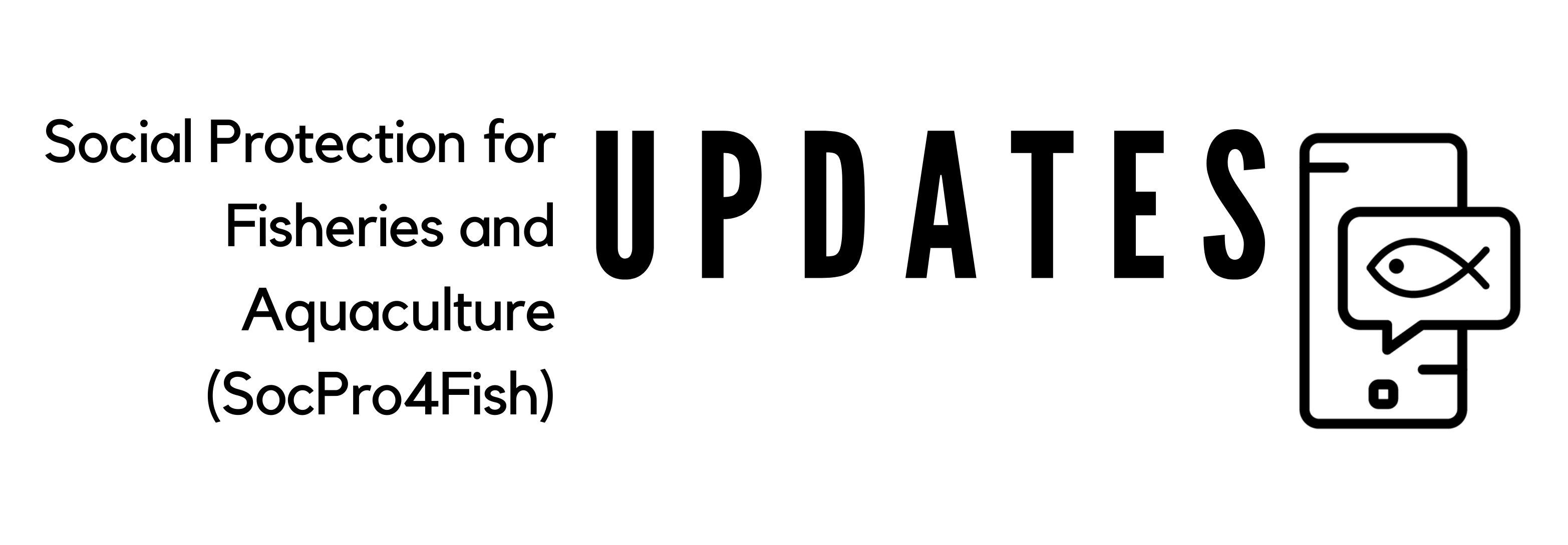SocPro4Fish Updates | Focus on Tunisia

Background
Tunisia has a social protection system operated mainly by the Ministry of Social Affairs. It aims to protect vulnerable groups in society and provides guarantees for the weakest and poorest communities. Due to access barriers such as the incompatibility of existing systems and the needs/lack of knowledge/interest of fishers to join the social security system, the most advantageous benefits sometimes do not reach the poor and vulnerable populations such as small-scale fishers.
In 2013, a reform of social protection began with political will. The trend in the country is toward the gradual inclusion of small-scale fishers through the evolution of legislation by providing a definition of artisanal fishing and recognizing the specificities of this sector.
The fishing sector not only has different working conditions than other sectors but is also known for its high fatality rate. The seasonality of work is particularly pronounced among fishers in the north of the country, where there are more than 100 days of bad weather which compromises the fishing season. Added to this is the decline in resources due to illegal fishing and climate change. Small-scale fishers are mostly self-employed, have limited resources and are generally affiliated to UTAP (Union tunisienne de l'agriculture et de la pêche/ Tunisian Union of Agriculture and Fisheries) but an increasing number of artisanal fishers are joining community-based organizations called GDPs (Groupement de Développement de Pêche).
SocPro4Fish Project in Tunisia
Through the SocPro4Fish (Social Protection for Fisheries and Aquaculture) project, implemented under the "Responsible Use of Fisheries and Aquaculture Resources for Sustainable Development” umbrella project funded by Norad, FAO is working with the Tunisian government to support economic inclusion and to extend social protection to small-scale fishers.
FAO is working with national stakeholders such as the Ministry of Agriculture, the Ministry of Social Affairs, the Centre for Social Research and Studies/Centre des Recherches et des études Sociales (CRES) and the Tunisian Union of Agriculture and Fisheries – UTAP to develop a comprehensive social protection framework for the sector. The project aims to improve the livelihoods of artisanal fishing communities by increasing their access to social protection services and strengthening their resilience to shocks.
To achieve these goals, the project will implement various activities in Tunisia. One of the first achievements of the project is the establishment of a technical committee that brings together inter-institutional actors that will work collaboratively towards the improvement or modification of social protection systems in a way to better target and reach fishers. Activities include the collection of socio-economic data in the artisanal fisheries sector to assess the characteristics of the sector and to inform on the barriers to access to social protection.
The project has identified the lack of socio-economic data in the sector as an obstacle to making informed decisions about social protection programmes, and therefore the need to establish a register of fishers. Furthermore, it recognizes the need for available data on the sector to be digitised and make it interoperable with social protection registers. As part of the planned activities, the project will pilot an integrated register to collect socio-economic data on the artisanal fisheries sector.
In parallel, the SocPro4Fish project is also developing a comparative analysis of social protection programmes in the artisanal fisheries sector in countries with similar contexts to learn from their experiences and inform future programmes in Tunisia; and to develop an action plan at national level to improve existing social protection programmes to better target the artisanal fisheries sector.
During January and February 2023, FAO’s partner CRES, in collaboration with the Ministry of Social Affairs, conducted a preliminary exploratory study. This showed that artisanal fishers have limited knowledge of available social protection programmes, uncertainty about the institutions and lack appropriate programmes tailored to their needs, which ultimately results in limited access to social protection. Based on the results of the data collection exercise, the project will develop a feasibility study identifying quantified solutions for extending social security coverage and quality of benefits to artisanal fishers.
